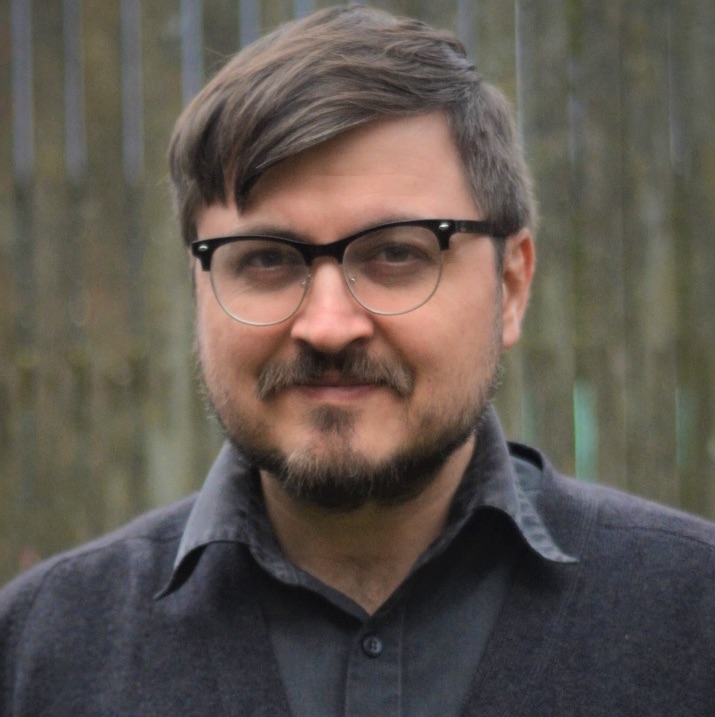How companies profit from forced labor in Xinjiang
Factories of Turkic Muslim internment, part of China’s reeducation camp system, are subsidized and directed by the state, and employ many former detainees at a fraction of minimum wage. Companies, both Chinese and foreign, are taking advantage.
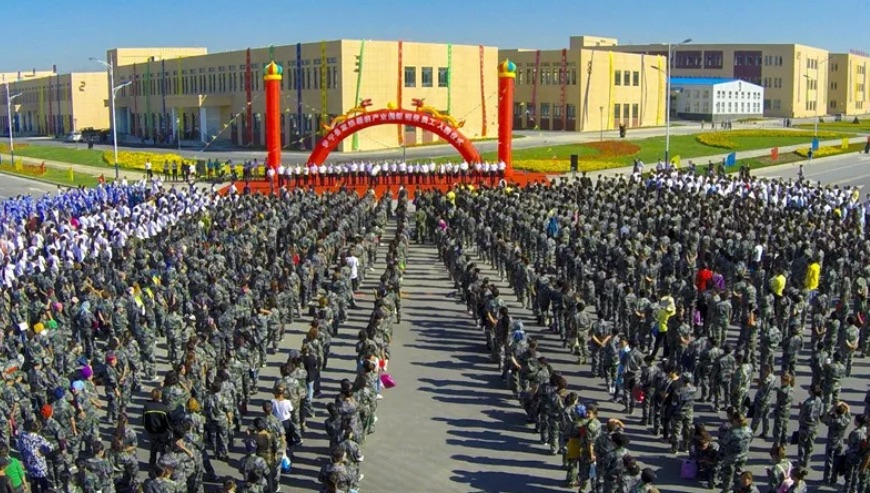
Pictured: According to a state-sponsored report, on August 15, 2017, 1,805 minority herders and farmers entered the new industrial park and “put on leather shoes” to become industrial workers.

On November 3, 2018, Erzhan Qurban, a middle-aged Kazakh man from a small village 50 kilometers from the city of Ghulja in the Xinjiang Uyghur Autonomous Region, was released from the camp where he had been held for nine months. He thought that perhaps now he would be free to return to his former life as an immigrant in Kazakhstan. Yet just a few days later, he was sent to work in a glove factory back in Ghulja city.
Erzhan had been detained soon after he came back to China to seek medical treatment for his daughter and care for his ailing mother in early 2018. In an interview with the German magazine Die Zeit, he said:
On the evening of February 8, 2018 they picked me up in a minibus. It was already dark and they put black plastic sacs over our heads and handcuffs on our wrists. There were five young men from my village with me in the minibus. The room in which I had to stay for the next nine months was 5 meters by 5 meters and located on the third floor. On the door, a sign said “No. 12”. Our floor alone accommodated 260 men. In my room, we were twelve. Later I heard that there had been more than 10000 men detained in our camp.
Erzhan was unsure exactly where the camp was located. Based on the timing of his detention, it was likely the one up by the base of the mountains, rather than the one where his coworkers were held just 8 kilometers from the glove factory.
 Images showing the construction of a camp on the outskirts of Ghulja city between October 8, 2017 and May 12, 2019. Many internment factory workers were held in this camp before being transferred to an industrial park 6 kilometers away.
Images showing the construction of a camp on the outskirts of Ghulja city between October 8, 2017 and May 12, 2019. Many internment factory workers were held in this camp before being transferred to an industrial park 6 kilometers away.
As has been often reported by camp survivors, conditions in the camp where appalling. Describing the circumstances of his detention, Erzhan said:
The toilet was a bucket by the window, there was no running water. In the daytime, we were sitting in rows on our plastic stools. The food was handed to us through an opening in the door. At 7 am, we had to sing the Chinese national anthem, and then we had three minutes for breakfast. Afterwards, we learned Chinese until 9 pm. Our teachers were Kazakhs or Uyghurs. We were watched by four cameras in our room, which ensured that we didn’t talk to each other. Those who spoke anyway were handcuffed and had to stand by the wall. “You don’t have the right to talk, because you are not humans,” said the guards. “If you were humans, you wouldn’t be here.”
Erzhan said he still does not know why he was taken. Like others detained in Ghulja, the “micro-clues” (微线索 wēi xiànsuǒ) of his “pre-terrorist extremism” were likely the fact that he possessed a passport and had traveled to Kazakhstan, one of 26 Muslim-majority countries on a Chinese state watch list. In any case, over time the grueling routine began to change his mental state. He said: “The first two months, I thought of my wife Maynur and my three children. Some time later, I only thought about food.”
In May 2018, about the time that Erzhan was reduced to thinking about his bodily survival, Pan Daojin, the Front Commander and Party Secretary of Yili Prefecture, arrived to inspect a newly built industrial park on the other side of Ghulja. He came with a delegation from Jiangsu that was tasked with providing industrial “aid” in Xinjiang. Party Secretary Pan, who was also from Jiangsu, “fully affirmed the achievements” of the business leaders from Nantong City in Jiangsu who had funded the industrial park. The delegation showed off the new factory of the Jiangsu-based Solamoda Garment’s Group — a company that partners with Forever 21 and other international brands. They also stopped by the glove factory, the Yili Zhuowan Clothing Manufacturing Company, where Erzhan would be eventually sent. It was managed by employees of the Luye Shuozi Island Trading Company, a manufacturer based in Baoding city in Hebei Province.
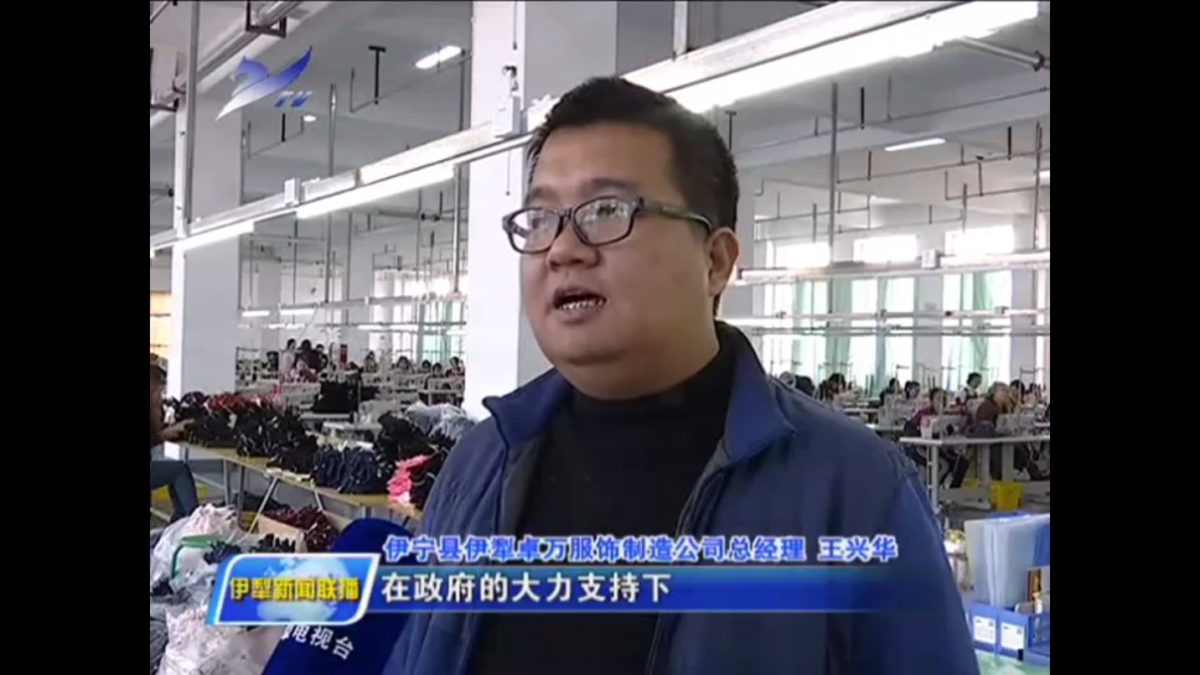
According to the general manager of the glove factory, Wang Xinghua, speaking in state TV interview released in December 2018, “With the support of the government, we have already ‘recruited’ more than 600 people.” One of these 600 government “recruits” was Erzhan, who had arrived from the camp less than a month before. Continuing, General Manager Wang said that since the founding of the new factory in 2017, “We have generated more than $6 million in sales. We plan to reach 1,000 workers by the end of this year. We plan to provide jobs to 1,500 people by the end of 2019.”
In fact, the glove factory in Ghulja has now far surpassed the capacity of its parent factory. Back in Hebei, the company employed less than 200 employees. Moving manufacturing to Xinjiang made sense for the company, which sold 96 percent of its leather and fleece gloves across the border in Russia and Eastern Europe. On the company’s Alibaba distribution site, it notes that the price of the gloves range from between $1.50 and $24.00 per pair, depending on the style of the glove and quantity purchased. Some are distributed by the up-scale Hong Kong-based boutique Bread n Butter, which has outlets in malls around the world. Through detainee work, the company is generating tremendous profits.
But there were other reasons why exponential growth was so easy. Since 2018, the state has provided subsidies to build factories and ship goods from Xinjiang. Construction of the factories was often funded by local governments in Eastern China as part of a “pairing assistance” program. Up to 4 percent of new factory sales volume was subsidized in order to cover shipping expenses from the new location. A state program gave reeducation system employers 5,000 yuan ($700) for each coerced worker they trained. Most importantly, as in every county in Xinjiang, there was a standing reserve of tens of thousands of desperate, traumatized detainees like Erzhan in nearby camps.

Since 2017, factories have flocked to Xinjiang to take advantage of the cheap labor and subsidies offered by the reeducation camp system. In fact, in late 2018, the primary development ministry for the region circulated a statement that the camps — or so-called “vocational skills education and training centers” (教育培训中心 jiàoyù péixùn zhōngxīn) — had become a “carrier” (载体 zàitǐ) of the economy. Because of this system, Xinjiang had attracted “significant investment and construction from coast-based Chinese companies.” This was particularly the case in Chinese textile and garment-related industries, since China sources 80 percent of its cotton in Xinjiang. In an effort motivated at least in part by rising labor costs among Han migrant workers on the east coast, by 2023, the state plans to move more than 1 million textile and garment industry jobs to the region. If they succeed, it will mean that as many as one in every 11 textile and garment industry jobs in China will be in Xinjiang. The 1,500 jobs at the glove factory in Ghulja are part of that number.
Since 2017, factories have flocked to Xinjiang to take advantage of the cheap labor and subsidies offered by the reeducation camp system.
In a July article, the scholar Adrian Zenz described three primary tracks through which Uyghurs and other Turkic Muslims are involuntarily assigned to work in the newly built factories. First, many detainees in camps are placed in factories inside or adjacent to camps. Others, as in the case of Erzhan, are assigned to factories in newly built industrial parks or “satellite factories” (卫星工厂 wèixīng gōngchǎng) near their hometowns. Second, some new industrial parks host a mix of detainees and “rural surplus laborers” who are not former detainees. Third, still other coerced workers (particularly women with young children) are assigned to work in satellite factories supplemented by daycare facilities near their hometowns. As Zenz concludes, all three of these tracks result in forms of family separation and dependence on the state and private industry proxies for training and discipline in Chinese-speaking environments. Furthermore, in all cases, Turkic Muslim detainees are forcibly assigned to these positions. Refusing to work could result in their detention. As numerous state documents have noted, refusing “poverty alleviation” (扶贫 fúpín) schemes (a euphemism for the entire reeducation system) is regarded as a sign of resistance and religious extremism.
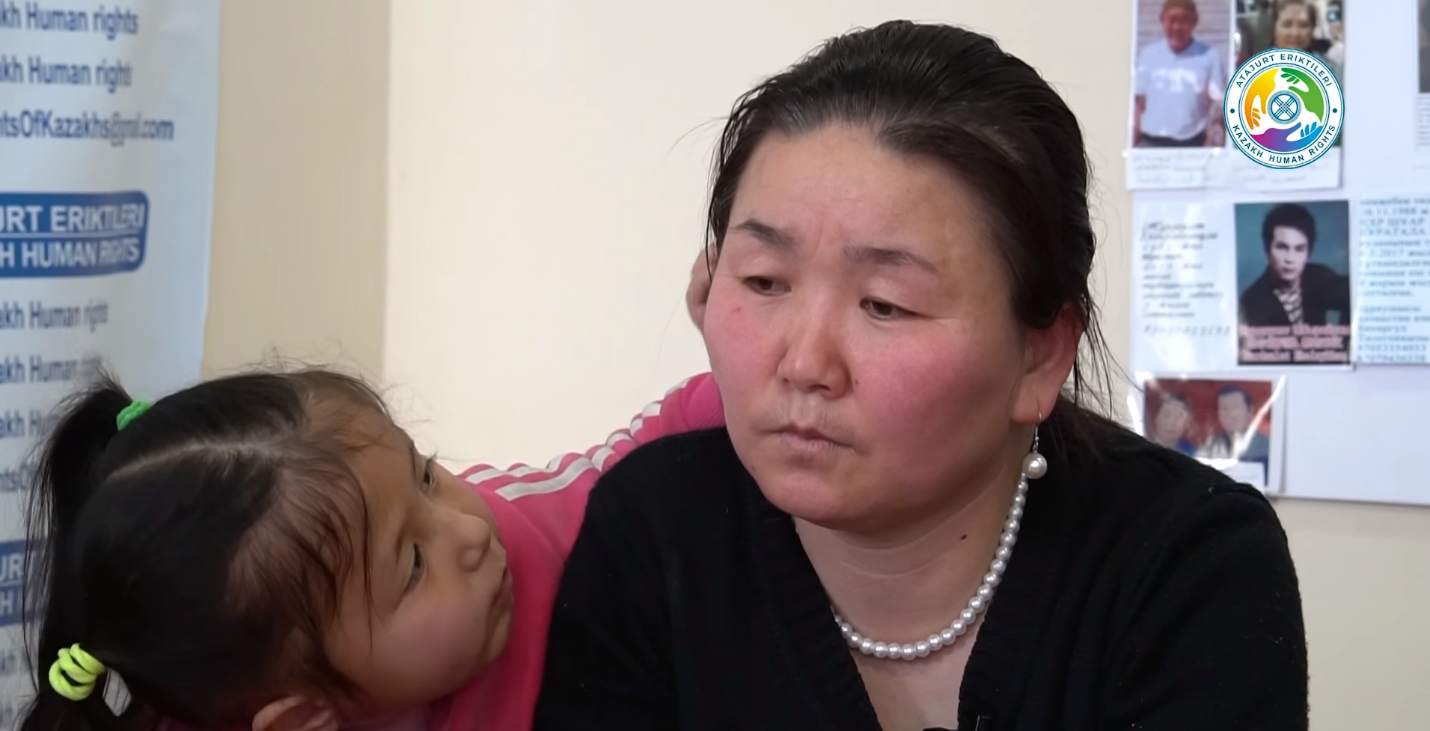
Several months before Erzhan arrived at the glove factory, another Kazakh detainee named Gulzira Auelkhan was also transferred from a nearby reeducation camp to work at the factory. Before arriving, Gulzira, a 39-year-old mother of a toddler, had endured 15 months of horrific abuse in crowded cells with 18 to 60 other detainees.
Like Erzhan, when she was released from the camp, she thought she may be given greater freedom. But, as she told the Globe and Mail, within several days a local village leader appeared with a document saying that she must report for work at the glove factory.
When she arrived, she was told that as a trainee she would be paid 600 yuan (a little more than $80) per month, less than half the minimum wage, for the first three months. She would also be paid a small amount, less than 1 yuan ($0.14) per pair of gloves, according to her “efficiency.” “The most skilled worker could sew 60 pairs a day,” she said. “I tried my best, but I could only sew 13 pairs.”
Although there was much less security in the factory, the detainees were not allowed to leave. “After being in a camp, your ID card would ring whenever you went through metal detectors, and they’d take you to the police station to be interrogated, making it impossible to be free,” Gulzira said. As she told the AFP, every night after work she and other detainees were taken to a makeshift dormitory about three kilometers away. The blue-roofed buildings, which had been inspected and approved by Party Secretary Pan Daojin several months before the detainees were transferred to the factory, were built on the soccer field of a local high school.
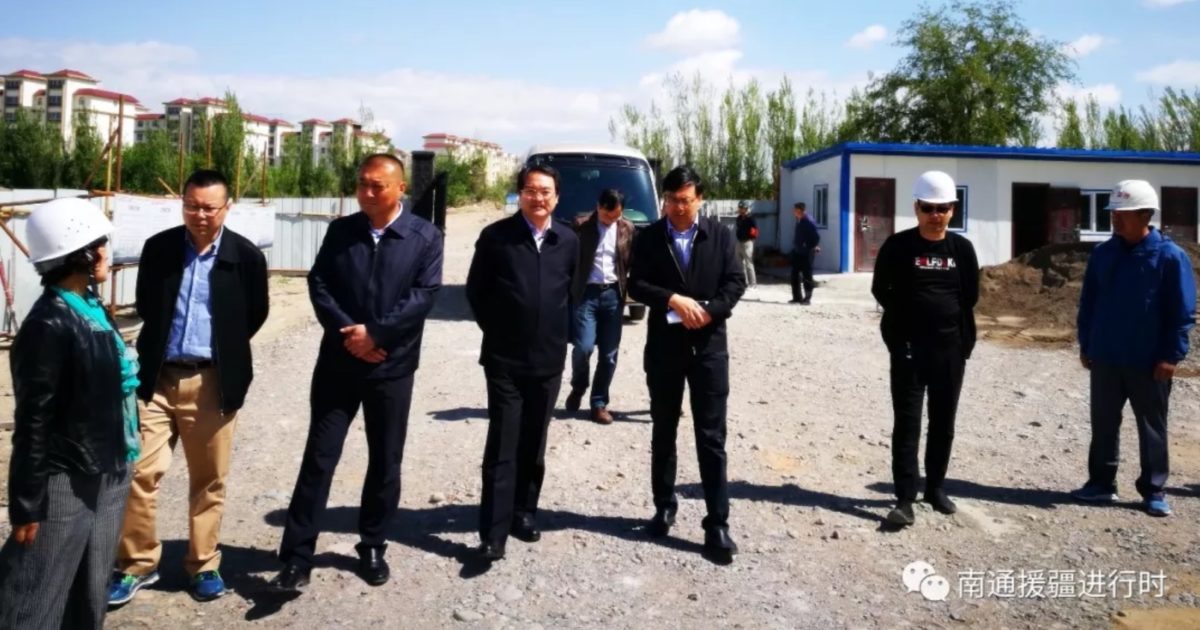
In the dormitory, detainees were permitted to walk around the campus of the high school, but they were not permitted to leave the premises. According to reporting from the Globe and Mail, the workers “received readings in the factory before work and, at day’s end, 45-minute Chinese lessons in the dormitory, where they were watched at night by an official.”
Both Erzhan and Gulzira were permitted to briefly visit their families after lunch on Saturdays. A company bus would ferry them back and forth from the dormitory to their home villages. A month into their “training,” however, they found out that these trips were quite costly. Bosses at the factory, such as General Manager Wang, told them that because of the expense of the shuttle service and their food expenses, their 600-yuan salary would be slashed in half. Erzhan later recalled, “I worked on a production line for 53 days, earning 300 yuan ($40) in total.”
Since the factories function as an extension of the camp system, outside the rule of law, prevention of worker abuse depends on the moral code of people like General Manager Wang. He knew just as well as Erzhan or Gulzira that if they complained or resisted in any way, he could replace them with other detainees. In December 2018, managers at the factory threatened Gulzira in order to get her to sign a one-year work contract. They told her that if she didn’t sign, she would be sent back to the camp.

Newly built industrial parks in Northwest China occupy a liminal space between labor camps and private industry, proletarianization and social elimination. State documents note over and over again that the new industrial parks are being built to teach “basic quality” to Uyghur and Kazakh detainees and other surplus laborers. What is left unsaid is that in Xinjiang, the labor is coerced, and furthermore is subsidized and directed by the state. The system is enforced by a complex web of technological surveillance that includes teachers, guards, “relatives,” and police that monitor the populace.
The goal of the internment factories is to turn Kazakhs and Uyghurs into a docile yet productive lumpen class — one without the social welfare afforded the rights-bearing working class. This system of controlled labor is, in the words of the state, “carried” (载体 zàitǐ) forward by a massive internment camp system, a mechanism that ensures that this new class of interned laborers cannot organize as a class for themselves. The only thing that protects Turkic Muslim workers from exploitation and violence is the good will of their Han managers. People like General Manager Wang and Party Secretary Pan know they have near unlimited power at their disposal within these spaces. They know that in the global race to the least cost for the highest rates of production, the glove factory in Ghulja is as good as it gets.
Darren Byler’s Xinjiang Column is published on the first Wednesday of every month. Previously:
